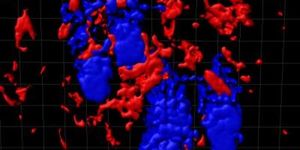A study from Harvard Medical School researchers at Massachusetts General Hospital and Brigham and Women's Hospital reveals for the first time exactly how mutations associated with the most common form of inherited Alzheimer's disease produce the disorder's devastating effects. Appearing in the March 4 issue of Neuron, the paper upends conventional thinking about the effects of Alzheimer's-associated mutations in the presenilin genes and provides an explanation for the failure of drugs designed to block presenilin activity.

"Our study provides new insights into Alzheimer's disease by showing how human mutations that cause the disease lead to neurodegeneration and dementia," said Raymond J. Kelleher III, HMS assistant professor of neurology at Mass General and co-senior author of the Neuron paper. "We found that mutations in the presenilin-1 gene promote the hallmark features of the disease by decreasing, rather than increasing, function of the presenilin-1 protein and the gamma-secretase enzyme. In addition to the important therapeutic implications of our findings, we have also generated the first animal model in which an Alzheimer's disease-causing mutation produces neurodegeneration in the cerebral cortex."
While inherited or familial Alzheimer's disease is very rare, accounting for only around 1 percent of cases, the identification more than 20 years ago of the genes that cause familial Alzheimer's disease provided the first clues into the mechanism behind the effects of the disease. The rarest familial Alzheimer's disease-associated mutations are found in the amyloid precursor protein, which is clipped by multiple proteases to produce the beta-amyloid peptides that form the amyloid plaques characteristic of the disease.
Mutations in two presenilin genes account for around 90 percent of familial Alzheimer's disease cases. These two genes encode essential components of gamma secretase, one of the proteases that process amyloid precursor protein. Individuals with presenilin-associated familial Alzheimer's disease develop Alzheimer's symptoms even earlier than do those with amyloid precursor protein mutations.
While the mechanism by which presenilin mutations cause neurodegeneration has not been known, the general thinking was that they increase presenilin and gamma secretase activity, resulting in overproduction of beta-amyloid and particularly of beta-amyloid 42, which is thought to be more prone to deposition in plaques. As a result, development of gamma secretase inhibitors has been a major therapeutic effort pursued by pharmaceutical companies.
But Jie Shen, HMS professor of neurology at Brigham and Women's and co-senior author of the Neuron paper, questioned this widely held view and the use of gamma secretase inhibitors to treat Alzheimer's disease. Her earlier investigations into the normal function of the presenilin genes showed that genetically suppressing presenilin and gamma secretase activity in adult mice caused Alzheimer's-like neurodegeneration, results that contrasted with studies in which the overproduction of beta-amyloid or presenilins failed to produce neurodegeneration.
In a 2007 paper published in PNAS, Shen and Kelleher-who had been treating familial Alzheimer's disease patients with mutations in the presenilin-1 gene and researching brain mechanisms underlying cognitive function-proposed what they termed the presenilin hypothesis: a loss of presenilin function may be the primary event triggering neurodegeneration and dementia in familial Alzheimer's disease.
In recent studies, Kelleher identified a novel familial Alzheimer's disease-causing presenilin-1 mutation that inactivated its function in a sensitive cell-culture system. In collaboration with Shen, his group went on to show that a series of familial Alzheimer's disease mutations all impaired presenilin-1 function in cell culture.
These findings raised the pivotal question of how such mutations affected presenilin-1 function in living animals, especially in the brain. While Shen's earlier investigations had used strains of mice in which one or more copies of the presenilin genes were totally inactivated, for this study she and Kelleher generated mice in which specific, familial Alzheimer's disease-associated presenilin-1 mutations were "knocked in" to the gene, causing them to be expressed just as they are in human patients with that particular mutation.
One of the mutations they tested is relatively common among familial Alzheimer's disease patients, while the other is fairly rare. Both are located near the site where the protein interacts with its target molecules when incorporated into gamma secretase. As was the case with animals in which both copies of presenilin-1 were deleted in earlier studies, those in which both copies were mutated did not survive after birth. Mice in which a single presenilin-1 gene was mutated survived, but they showed deficiencies in learning and memory compared with control mice.
Production of beta-amyloid within the brains of these mice was actually reduced, although the ratio between forms of the peptide was changed, with proportionally more plaque-associated beta-amyloid 42 being generated. Closer examination of the brains of mice with the familial Alzheimer's disease mutation showed the same sort of synaptic dysfunction and age-associated neurodegeneration seen in the brains of patients with Alzheimer's disease.
"This paper clearly shows that these familial Alzheimer's disease mutations cause a loss of presenilin function and gamma secretase activity, leading to the loss of neurons in the adult brain," said Shen. "The most important implication of our findings is that strategies that enhance rather than inhibit gamma secretase should be investigated as potential Alzheimer's therapies. They also may explain why a major clinical trial of a gamma secretase inhibitor failed to help patients and actually worsened their cognitive abilities."
Shen added that their presenilin hypothesis does not rule out a role for beta-amyloid in Alzheimer's pathology; it just places presenilin/gamma secretase activity closer to the pathway that leads to neurodegeneration.
While this study examined only presenilin-1 mutations, Kelleher noted that the researchers believe that loss of function is a general property of familial Alzheimer's disease mutations in both presenilin genes. Investigation of the mechanisms underlying the effects of the amyloid precursor protein mutations is also warranted, as is examination of how presenilin dysfunction may contribute to the common, late-onset form of Alzheimer's disease.
"Shared or convergent molecular pathways may be responsible for pathogenesis in both familial and sporadic forms, and we hope that mechanistic relationships will become clearer with the identification of genetic risk factors for sporadic or late-onset Alzheimer's disease," he said. "We're now actively pursuing strategies to develop candidate therapies that restore presenilin-1 function. We also hope that our knock-in mouse model will facilitate development and preclinical testing of these and other agents that can combat neurodegeneration in Alzheimer's disease."
Source: Harvard Medical School









